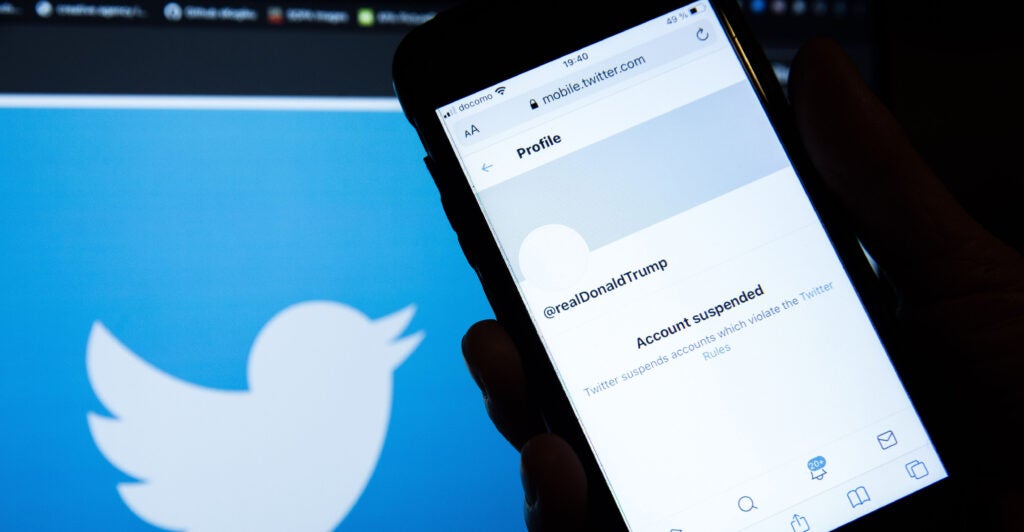In the weeks since the November presidential election, numerous liberals, leftists, and other opponents of President Donald Trump have called for a purge of him and his supporters from public life.
Just days ahead of the inauguration of President-elect Joe Biden on Jan. 20, those purges have begun in earnest.
In the wake of the protest that turned into a mob and then into a riot at the U.S. Capitol building, various media and high-tech companies have used the moment not simply to condemn the violence, but to remove the president of the United States and countless other Americans from their digital platforms.
It’s understandable that many Americans are shaken by what they saw at the Capitol last week. It’s part of a larger pattern of mob law.
But the crimes of a few lawbreakers should not be used as an excuse to punish and silence other Americans simply because of their political beliefs.
Those actions appear to be targeted and coordinated. It’s a deeply disturbing trend, given that Biden and his fellow Democrats are less than 10 days from effectively controlling both Congress and the executive branch.
While Biden may be preaching “unity,” in some of his public statements, he hasn’t refrained from, for example, comparing his opponents with Nazis.
Worse, Biden’s allies are almost universally celebrating the purges and calling for more retributions against political enemies. That’s apparently what the anti-Trump Lincoln Project intends to do; namely, create a “blacklist” of people who worked for the Trump administration.
Meanwhile, an editor at Forbes magazine, Randall Lane, warned that there would be a “truth reckoning” for companies that hire or do business with former Trump staffers.
Wasn’t McCarthyism supposed to be a bad thing?
These attempted purges aren’t being engaged in only by media and advocacy groups.
Trump was banned on Twitter and Facebook and other platforms. Twitter’s official statement cited “risk of further incitement of violence” from Trump’s tweets about not attending the Biden inauguration.
But its justification still rings hollow, given how they allow the Chinese Communist Party, Venezuela’s Nicolas Maduro, and the ayatollah of Iran to have a platform, as many have pointed out.
That only adds to the long list of uneven enforcement actions that we’ve seen in recent years from Big Tech, which almost always errs on the side of shutting down right-leaning voices—including The Heritage Foundation and The Daily Signal—before anyone else.
While Twitter was banning Trump, other Big Tech companies were smashing alternatives to Twitter.
Apple announced that it would pull Parler, a Twitter alternative, from its app store, accusing it of inciting violence.
“We have always supported diverse points of view being represented on the App Store, but there is no place on our platform for threats of violence and illegal activity. Parler has not taken adequate measures to address the proliferation of these threats to people’s safety. We have suspended Parler from the App Store until they resolve these issues,” Apple’s statement read.
Google also dropped Parler from its app store.
Then, Amazon took it a step further , announcing that it would pull Parler from its server for supposedly violating its terms of service, effectively shutting it down.
These removals, according to Apple, Google, and Amazon, centered on Parler’s lack of a moderation mechanism for violent content.
Parler might very well have violated the terms of service for those companies, but the way this all occurred at once—and to a platform championing free speech—is disturbing.
Mozilla CEO Mitchell Baker announced that “deplatforming” people from its services wasn’t enough, and that change “requires more than just the temporary silencing or permanent removal of bad actors.”
Mozilla owns Firefox, a major web browser, and has ties to Google.
What’s perhaps more shocking is the dramatic difference in how these same companies treat the left.
Last year, a book in defense of looting received sympathetic media coverage, and plenty of prominent commentators even defended vandalism and property destruction in the wake of riots as “nonviolent.”
Some went so far as to say that violence is an acceptable means of affecting policy change.
That, by contrast, was not met with mass social-media purges and deplatforming.
Tech companies have the right to set their own policies, yet it’s hard to overlook the rampant inconsistencies and double standards with which they apply them.
If even the president can be silenced by a Big Tech cabal, what’s the average American to do when that mighty, metaphorical digital knee comes down on their neck? Big Tech is signaling to half the country that they very soon also might be silenced.
In Thomas Jefferson’s first inaugural address after the highly contentious 1800 presidential election that nearly ended in civil war, he said that “we are all republicans, we are all federalists.”
Those who opposed republican government, Jefferson said, were marginal and that his political opponents should be debated, not silenced by force.
He said: “If there be any among us who would wish to dissolve this Union or to change its republican form, let them stand undisturbed as monuments of the safety with which error of opinion may be tolerated, where reason is left free to combat it.”
As I wrote in November, not all kinds of political unity are the same. Bridging political divides and treating all Americans as fellow countrymen is one kind. Crushing dissent and coordinating with institutions of power to silence critics and political opponents is another—but not one that can exist in a system of ordered liberty.
It’s troubling to see the latter as the direction in which America is heading.
